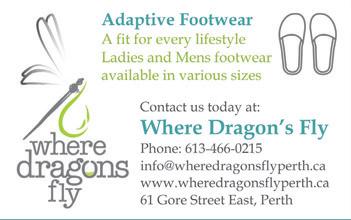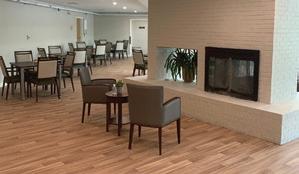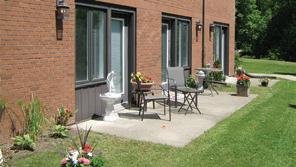






Dear Patients and Families,
Welcome to the Perth and Smiths Falls District Hospital (PSFDH). We hope that you find the information in our Patient and Family Handbook beneficial during your stay/visit.
This handbook was created in a collaborative project with the PSFDH staff and the Patient Family Advisory Council (PFAC). We hope that this handbook will assist you by answering your questions. You and your family members can become key members of your healthcare team. Please feel free to share with your health care team (staff, physicians and volunteers) any questions/ concerns that may arise during your stay.
It is the PSFDH’s mission to provide high-quality person-centered care built on collaboration and partnerships with our patients and their families. PSFDH employees/volunteers take pride in our facilities and services. The hospital is dedicated to ensuring that patients and families receive exceptional patient-focused care every time based on most current best practices. Looking ahead, the hospital strives to continue to grow and further enhance the programs and services offered.
PSFDH appreciates your feedback, so please let us know how PSFDH can improve services or simply let us know what you think. This assists the PSFDH team to continue to enhance and provide safe, excellent, patient and family-centered healthcare.
As this is the 30th Anniversary of the PSFDH (1995-2025) we hope that during the next 30 years the hospital will continue to provide our community with up-to-date high-quality patient and family centered care close to home.
Michael Cohen President & CEO
Warren Hollis Chair, PSFDH Board of Directors
Dorothy Thomson Patient Advisor and Co-Chair Patient & Family Advisory Council
The Perth and Smiths Falls District Hospital acknowledges that it is situated on unceded traditional Algonquin territory and with this acknowledgement comes respect for the land, people and the shared history of the territory. PSFDH recognizes the injustices of the past and those that continue today. As PSFDH seeks to achieve Reconciliation, PSFDH is committed to speaking Truth and working towards Justice in solidarity with Indigenous Peoples.
The PSFDH is also committed to taking action in areas that it can to recognize and work with the Indigenous community through enhancing supportive health care choices, building partnerships and continuous learning.
Reference: www.lanarkcountyneighbours.ca

The PSFDH is a fully accredited acute care health care organization located on two state-of-the-art sites. The PSFDH is situated on Algonquin Territory in the heart of the Rideau Canal region and proudly provides health services to more than 75,000 people in the surrounding communities. PSFDH delivers a broad range of acute and secondary services and programs such as emergency care, diagnostic imaging (CT Scan and MRI services) obstetrics, general and specialty surgical services, dialysis as well as laboratory and infection control services.

In December 2024, PSFDH and its regional partners launched a new health information system connecting people and healthcare providers with one secure, shared electronic medical record.
The Lumeo system is an efficient and secure way for your healthcare providers to share information, and with the patient portal to be launched in 2025, for you to access your medical record and information about your health history, appointments, test results and treatments.
The Lumeo system benefits everyone. You won’t have to repeat your medical history to each member of your healthcare team –they will be able to access your information through the Lumeo system’s shared electronic medical record.
Your healthcare team will no longer be using paper charts and will be using more technology such as smart phones, mobile workstations and scanners, such as armband scanners. There will be limited paper charts for consents, etc.
Clinical practices (the way things are done) will be more standardized across the region so you will know what to expect at your appointment.
Note: medical records from your family doctor / health team are not part of the HealtheLife portal. This portal is not connected to the “My Chart” or “My Heart” patient portals.
Visit www.lumeorhis.ca/healthelife-portal for more portal information.
Our Regional Partners:
• All patients and visitors are asked to refrain from wearing perfumes, colognes or other scented products. Flower arrangements must also have low scent.
• Latex balloons may cause severe allergic reactions in some people. Any balloons brought to PSFDH are made of foil not latex as latex balloons are not permitted in the hospital.
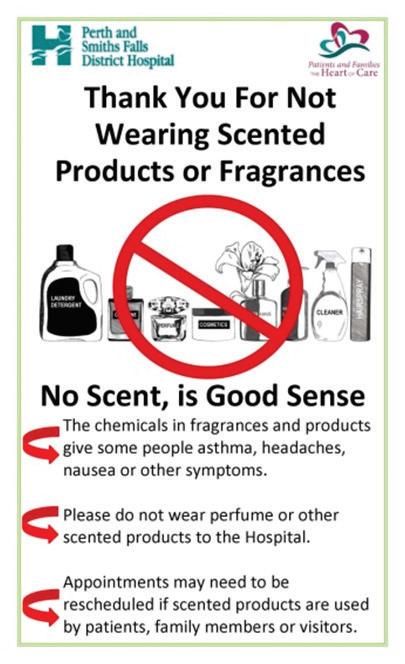
• There may be an Ambulance charge for patients transported to the hospital by Ambulance.
ATM/Banking
• Banking Machines are located in the Perth ER waiting area and Smiths Falls Site Cafeteria.
Cafeteria
• Cafeterias are accessible at each site. Monday to Friday from 10:00 a.m. to 1:30 p.m. Vending machines are available outside of regular business hours in the Emergency Waiting Rooms and the Smiths Falls Cafeteria.
• The main business office is located on the main floor of the Smiths Falls Site and is open Monday-Friday, 8 a.m. to 4 p.m. Patient accounts can also be paid at the Patient Registration Department at the GWM/Perth Site. Payment can be made by cash, cheque, Visa, MasterCard or debit.
• Every effort is made to protect the hospital against fire. If you hear the fire alarm, please remain where you are and listen for direction as it may only be drill. During a fire alarm, elevators are shut down and all fire doors automatically close until there is an “All Clear” announcement on public speakers. If you are in a stairwell during a fire alarm, please proceed to the closest point of exit and wait at the stairwell door. Staff will provide directions, if required.
• The GWM/Perth Auxiliary Gift Shop is located on the GWM/ Perth Site. Operating hours are Monday to Friday from 9:00 a.m. to 4:00 p.m.
• The Smiths Falls Community Hospital Gift Shop has two locations:
• On-site – 60 Cornelia Street West, Smiths Falls;
• Off-site – Settlers Ridge Centre, 275 Brockville Street in Smiths Falls.
• Perth and Smiths Falls District Hospital: 613-283-2330 (SF) or 613-267-1500 (Perth)
• Perth & Smiths Falls District Hospital Foundation: 343-881-GIVE (448) or toll free 1-833-680-GIVE (4483)
• Please do not bring any valuables with you. Any valuable items remain your responsibility.
• If during your stay you have misplaced or lost an item, please speak with a member of your health care team as soon as possible.
• Patient mail is delivered regularly. Your incoming mail should be labeled clearly. If the patient has been discharged, any mail received after discharge will be returned to the sender.
• PSFDH offers an e-mail service for our patients. Anyone with internet access can go to https://psfdh.on.ca/sendgreetings and create a colourful card. The message will be printed and delivered to the in-patient. Please note that PSFDH does not provide a means for the recipient to reply to your message.
• Both sites can be accessed 7 days/week. GWM (Perth) Site (via Drummond Street) and SF Site (via Elmsley Street) Main Entrances Monday to Friday 7:00 a.m. to 4:00 p.m. After hours, please access the building via the Emergency Department.
• Meals are delivered to the rooms as follows:
• Breakfast: 7:45 a.m. – 8:15 a.m.
• Lunch: 11:45 a.m. – 12:15 p.m.
• Dinner: 4:45 p.m. – 5:15 p.m.
• In addition, snacks are always available on each nursing unit for patients. Snacks include items such as juice, milk, crackers, bread, peanut butter, etc. Please contact a member of your health care team if you have any questions or concerns. You are welcome to bring in your own food permitting there are no dietary restrictions during your stay. Please speak with a member of your health care team about bringing and storing your own food.
• All PSFDH buildings and properties, including parking lots, are 100% smoke free areas. This includes cigarettes, e-cigarettes, vaping, cannabis, etc. Non-compliance may result in individual fines that are enforced by local by-law enforcement agencies.
• It is $4.00 to exit the parking lot. Correct change is required ($1.00 or $2.00 coins only.) 5-day, 10-day or 30-day passes are available to purchase. Passes can be purchased from the Human Resources Department at the Smiths Falls Site (Monday - Friday) and Patient Registration at the Perth Site.
• For everyone’s safety and security, PSFDH has cameras throughout the facilities. As well, both sites can be accessed 7 days/week via the Emergency Departments after normal business hours (after 4 p.m. Monday to Friday) to the ER entrances. There is an on-site security guard in place at each site.
• Bedside telephones are provided free of charge. Each bedside telephone has its own extension number.
• To make a local call from a patient phone, dial “9” and the number you want. Long distance calls must be made through the Operator and be at the expense of the caller. Press “0” for assistance.
• Use of cell phones for telephone purposes at PSFDH is permitted inside hospital facilities (patient rooms, lobbies, waiting areas, lounges and private offices) with the exception of ICU, Operating Rooms, and Emergency Rooms. Signage is in place indicating the restrictions.
• Patients, visitors, staff and physicians are prohibited from using their cell phones for taking photographs, videos or voice recordings due to the privacy rights of our patients and staff. Cell phone users must also respect their surroundings and the people around them. All cellphone users are asked to keep their voices and ringers low.
• Televisions are available in the patient lounges.
• Please do not bring any valuables with you to the hospital. If you come with valuables, please ensure you have labelled each item and/or made arrangements to have them taken home. E-readers (such as Kobos, Kindles, etc.) are permitted. Laptops/ iPads/iPods/Radios are not to be used without headphones. PSFDH will not be held responsible for the loss or damage of personal belongings. Any valuable items remain your responsibility.
• Receiving support and visits from family and friends are encouraged and valued as well as visits with your pet. Please speak with a member of your health care team to discuss the requirements for your pet to visit.
• PSFDH offers free Wi-Fi access in all areas of the hospital. Computers are not provided by the hospital, but patients or families who bring in their own devices can connect to the Internet free of charge. Access to internet is subject to “restricted access” based on the PSFDH disallowed sites.



C – Caring Compassion
That, I, and those important to me, will be treated in a considerate, respectful and dignified manner by all members of the health care team.
C – Communication
C – Competence
C – Confidentiality
C – Commitment
To receive honest and meaningful information about my health and my care. To receive focused, timely attention to my queries and concerns.
To receive skilled, quality care protecting me from harm and focusing on best practice.
To have my privacy respected in all aspects of my care.
To be able to rely on the Hospital to continue to provide state-of-the-art health care to our communities.
Ensuring a good relationship with my care providers is important to me; I will share the responsibility for my health care by providing accurate information, asking for help when needed and being courteous and respectful.
Per Occupational Health & Safety Act - Bill 168, the Perth and Smiths Falls District Hospital does not tolerate violence in words, actions or gestures.
The Perth and Smiths Falls District Hospital is committed to providing exemplary patient care and to partner with patients and families. In order to achieve these goals, PSFDH makes the following pledge to you - the patient.
3 You have the right to be treated with dignity and respect in a manner which maintains your privacy and your right to confidentiality.
3 You have the right to be a full participant in your care and to receive relevant information and education concerning your condition, diagnosis, treatment and prognosis in a manner which is understandable to you.
3 You have the right to make fully informed decisions about the plan of care prior to and at any time during the course of treatment.
3 You have the right to refuse care to the extent permitted by law.
3 You have the right to expect that members of your care team will communicate and collaborate with one another in order to ensure continuity of care and safe transitions of care.
3 You have the right to know who is treating you at all times and which most responsible care provider is guiding your treatment.
3 You have the right to express your concerns and receive a response to your questions.
Your rights carry with them certain responsibilities. PSFDH asks you and your family (support person) to respect the following obligations:
3 Provide relevant information to the members of your health team to help them in the process of care.
3 Facilitate the provision of your care by identifying a spokesperson with whom PSFDH can communicate or provide a valid power of attorney, in the event that you become incapacitated.
3 Follow the care and treatment plan that you have participated in creating to the best of your ability.
3 Accept responsibility for the informed decisions you make about your treatment.
3 Be courteous and respectful of other patients, family members and members of the health care team.
3 Recognize that the needs of other patients and families may sometimes take precedence.
3 Recognize that providers need not provide any treatment to patients that the province may consider to be medically or ethically inappropriate.
3 Respect Hospital property and comply with Hospital regulations and policies.
3 Understand and be responsible for all expenses not covered by OHIP or private insurance during your hospitalization.
3 Be responsible for your own property and send home all possible valuables for safe keeping.
How is this different from what we do everyday?
The way patients and families view their care may be different
from that of the healthcare provider. This perception has been recognized as being key to providing safe, quality patient care. By bringing the perspectives of patients and families directly into the planning, delivery, and the evaluation of their own health care, in partnership with their health care providers, PSFDH can improve its quality and safety. The evidence is clear that when health care administrators, providers, patients and families work in partnership, the quality and safety of health care rises, providers and patients satisfaction increases and costs decrease. PSFDH will provide health care in partnership WITH our patients…and not just TO our patients.
Dignity and Respect. Health care practitioners listen to and honour patients and families perspectives and choices. Patients and families’ knowledge, values, beliefs, and cultural backgrounds are incorporated into the planning and delivery of care.
Information Sharing. Health care practitioners communicate and share complete and unbiased information with patients and families in ways that are affirming, useful and understandable.
Participation. Patients and families are encouraged and supported in participating in care and decision-making at the level they choose.
Collaboration. Patients, families, health care practitioners, and health care leaders collaborate in policy and program development, implementation, and evaluation; in facility design; and in professional education, as well as in the delivery of care.
Patients are encouraged to be active members of their health care team. It is important to come prepared for your medical treatment by understanding as much as you can about your medical problem, the treatments and /or procedures you will have, and to have a plan in place for when you go home. You should discuss any questions or concerns you have with a member of your health care team.
PSFDH is a recognized rural teaching hospital and welcomes many student learners and externs every year. As a result, you may experience the presence of healthcare professionals in training as part of your care team.
It is very important that the health care team know how you are feeling now; if you are taking any medication; if you have had surgery or recent illness that runs in your family; or if you have an addiction of any kind. It is important that you bring all the medication that you take with you to the hospital.
Before you leave the hospital, you may need to know:
• what sort of transportation you will need when discharged and the possible costs;
• whether you will need to pick up a prescription on the way home;
• if you will need care at home, what type of care, or if you will need someone to stay with you;
• if you require a special diet;
• when you can resume your normal activities such as work, school, exercise and driving;
• if and when you have any follow-up appointments.
Your health care team will discuss these issues with you before you leave.
PSFDH is committed to align with best practices related to the care of frail and vulnerable adults in hospitals. This includes early and regular promotion of mobilization through the “Move to Improve” program; Falls Prevention strategies; and screening for malnutrition and delirium.
PSFDH commits to the continuous improvement of access to hospital facilities, policies, programs, practices and services for patients and their family members, staff, health care practitioners, volunteers and members of the community with disabilities. Please discuss any accessibility concerns with your health care team or feel free to direct them to our Patient Relations Coordinator at patientrelations@psfdh.on.ca or by phone at 613-283-2330 ext. 1149.
Ontario residents with valid health cards are covered by the Ontario Health Insurance Plan (OHIP) and are entitled to standard ward accommodation. You may upgrade your room to semi-private (two patients per room) or private, when available. OHIP does not cover the upgrade costs. Patients may have insurance coverage to assist with these expenses.
Where possible, please confirm the type of coverage and daily maximum with your insurance provider, prior to admission. Some insurance companies place a daily maximum on the accommodation’s cost. Any remaining costs will be the responsibility of the patient. If you have requested an upgraded room, PSFDH will make every effort to accommodate your request as soon as possible.
PSFDH aims to provide the best quality of care to enhance your health, safety and well-being. You will occasionally receive a survey from Qualtrix XM seeking feedback regarding the care you received. Please take a moment to complete the survey as your comments are invaluable and help us to further enhance our programs and services. If you wish to discuss your experience directly with us, please contact our Patient Relations Officer at 613-283-2330 ext. 1149 or by email at
patientrelations@psfdh.on.ca . See Compliment/Concern card found later in the handbook.
Protecting your privacy is important. PSFDH ensures that your confidential information is kept secure and used only for the purposes stated.
Please note that your health records are kept secure in accordance with the Public Hospitals Act. Release of any information follows all legislative requirements. If you have any questions or concerns regarding your health record you may contact Health Records at 613-283-2330 ext. 1146 (Smiths Falls Site) or 613-267-1500 ext. 4215 (GWM/Perth Site). All medical/health records are stored in Canada.
For more information regarding your privacy, please visit: www. psfdh.on.ca/privacy or ask a member of your healthcare team.
Please try to have a recent medication review printout from your community pharmacist the week before any planned admission (surgery). Bring this review along with all of your medications you are taking including prescriptions and over the counter medications such as Tylenol, vitamins, CBD/Cannabis or herbal products that you take whether taken occasionally or on a regular basis.
In the event that you suffer a patient safety event while in hospital, PSFDH will thoroughly investigate the incident. PSFDH will involve you or your family member, with your consent, in the discussion and guarantee transparency and full disclosure.
The concepts outlined in the Apology Act also apply. PSFDH makes every effort to prevent incidents or errors, but if they do occur, PSFDH will make the necessary process changes to prevent further issues.
You will be asked to sign a consent form for certain tests, procedures and treatments. Before you sign, please make sure you know and understand the benefits and risks of the proposed treatment. This is called informed consent. If you have questions or need additional information, please speak with your doctor. You have the right to refuse treatment, but please ensure you are aware of what may happen if you do.
The goal is to support you to return to the comforts of your own home as soon as possible. In preparation, you are requested to:
• Confirm any costs associated with transport home (taxi, non-urgent patient transfer service) These costs are the responsibility of the patient and/or family.
• Make arrangements for transportation before you are discharged.
• Arrange for any required mobility aids such as walker, wheelchair, raised toilet seat, etc.
• Plan for attendance at any follow-up appointments.
• Plan for how your prescriptions will be filled.
• Make sure you have the Home/Community Care contact information (as needed).
• Make decisions about long term care and other alternative living arrangements.
• Please scan to read, “Quality Standard: Transitions between Hospital and Home.”
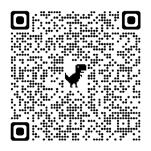
PSFDH is committed to working with patients, substitute decision makers, families, and caregivers during any transition in patient care. To facilitate a consistent and transparent approach to discharge planning, the South East regional hospitals, including PSFDH have developed a detailed process based on Bill 7, More Beds, Better Care Act. Please speak with a member of your health care team for more information.
If you have prepared an Advance Directive, Living Will or Power of Attorney for Personal Care, please tell a member of the health care team when you are admitted.
The Goals of Care (GoC) Designation is a medical order used to describe and communicate the general focus of your care, including your preferred location of care. You may never need your advance care plan – but if you do, you will be glad that it is in place. This allows you to consider your goals and have conversations with your Substitute Decision Maker (SDM), your health-care team and your family. The goal is to make sure that your voice is heard when you cannot speak for yourself. You are encouraged to talk to your health-care team about which GoC designation best reflects your health circumstances and your wishes and values.
1. Resuscitative Care (R): The focus is to extend or preserve life using any medical or surgical means. This includes, if needed, resuscitation and admission to the intensive care unit.
2. Medical Care (M): Medical tests and interventions are used to cure or manage an illness as best as possible but resuscitative or life support measures are not used. This is appropriate when resuscitative or life support measures won’t work, or the patient chooses against them.
3. Comfort Care (C): The focus of care is to provide comfort to ease a person’s symptoms without trying to control the underlying illness. This is for people who have a life-limiting illness, when treatments can’t influence the course of that illness.

When determining what your GoC are, consider whether they are for prevention, cure, prolonging life, or end of life care.
It can be helpful to talk to others about your care wishes, including:
• Your spouse or partner, or other family members or friends.
• A healthcare team member, such as a doctor, nurse, or social worker.
• Chaplain or someone in your faith group.
Understanding your medical condition is important. You may want to ask:
• Is it possible to cure my illness or disease?
• What are the ways of improving the quality of my life at this point?
• Are other medical problems or side effects likely to arise?
• What can I expect to happen in the next weeks/months?
• What other medical interventions can be provided if I choose not to accept cardiopulmonary resuscitation (CPR)?
Once admitted to hospital, we ask you to consider the following to help us understand what is important to you:
• What represents a good quality of life for me?
• Will I still be able to experience things that make my life meaningful?
• Do I want everything done to prolong my life even if I do not have a good quality of life?
• Do I have cultural, religious or spiritual values that influence my care decisions?
• What values are important to you in your life?
For more information, visit www.advancecareplanning.ca
Reference: Queensway Carleton Hospital Patient Information Handbook, November 26, 2024
Family presence is encouraged and valued. Your care team will work with you to support Patient and Family Centred Care. Please be mindful of space limitations and the need to respect the privacy of all patients. Your healthcare team will work with you to develop a family visiting plan that best meets the needs for you and your family. Please check our website www.psfdh.on.ca for the most current visiting information. Family or friends who have a fever, cold or respiratory symptoms or other contagious illnesses like nausea and diarrhea should not come to visit.
Make sure that you, your family members and other visitors clean their hands often while in hospital with the hand sanitizer provided throughout the hospital facility. Please do not wear any perfumes, aftershaves, or other scents when visiting, as these may be harmful to other patients with respiratory conditions.
Our hospital works with Ontario Health (Trillium Gift of Life Network) to provide comprehensive end-of-life care that is compassionate in nature. This includes honouring a patient’s consent to donate organs and/or tissues after death or by ensuring that the opportunity for donation has been provided to the patient (if applicable) or the family/substitute(s) when a patient’s consent has not previously been registered.
To ensure that your donation decision is honoured, register your consent at www.beadonor.ca or in person at a Service Ontario center, and be sure to speak to your family about your wishes. One day, your death could have the power to save up to 8 lives and transform up to 75 others.
For more information on organ and tissue donation, please visit: https://beadonor.ca or https://www.giftoflife.on.ca/en/ or ask a member of your healthcare team to connect you with an Ontario Health (Trillium Gift of Life Network) Specialist in Organ and Tissue Donation.
While dealing with outbreaks, please adhere to hospital policies and wear a mask and personal protective equipment (PPE) as required. Please refer to directions posted on entry to unit and patient’s doorway.
PSFDH takes its commitment to promoting an ethical culture seriously. Building the organization’s ethics capacity, providing support to those making difficult treatment options decisions and faced with challenging ethics issues, and most importantly, ensuring that PSFDH delivers health care and provide services with the highest ethics standards, is essential.
PSFDH supports you in making good ethical decisions. For more information contact the Privacy Officer at privacyofficer@psfdh.
on.ca or 613-283-2330 ext. 1149 or request a copy of our pamphlet on Ethics from a member of your heath care team.
Restraint use may be considered and will be kept to a minimum and requires consent. Please discuss with a member of your healthcare team who will give you further information and a specific safety pamphlet regarding the use of restraints.
As part of the PSFDH’s ongoing commitment to safe and high quality patient and family centred care, with your permission nursing staff will transfer accountability also called, “rounding” to your oncoming nurse at the start and end of each shift. With this report nursing and interprofessional team members will check in with you to assess your personal needs, position/mobility and pain, as well as ensure that your belongings are within reach and that equipment is working correctly.Your family is also welcome to take part in this transfer if you wish. Research indicates that bedside reporting improves communication between the patient and their health care team as well as improves the patient and family experience in hospital.
Spiritual care is available to all patients as part of the hospital’s commitment to provide holistic care. Upon admission, you will be asked if you would like a visit from interfaith spiritual volunteers and/or your personal faith leader. Following admission, you may also notify your nurse at any time if you would like a visit. A “quiet” room is available on the main level of each site and is open to all people for reflection, meditation and prayer.
Staying active while you are a patient helps promote recovery and makes your transition home easier. Staying active while you are a
patient also helps to decrease falls. To prevent the negative effects of bed rest and immobility, ask your healthcare team members which activities you can safely do. Healthcare members are trained on activities of our Move to Improve program. Please remember your safety is important. Use your call bell to ask for assistance or plan with a member of your healthcare team on arranging a time for these activities.
Suggestions for staying active while in hospital include:
3 Going for walks in the hallway, with supervision and/or equipment as needed
3 Please have well supported, rubber-soled shoes while in hospital
3 Calling for supervision/assistance to walk to the bathroom
3 Performing some of your own hygiene, such as bathing or grooming after walking to the bathroom
3 Time out of bed or sitting in a chair for meals
Nursing Assistance
3 Nurses will respond to call bells and visit on a regular basis
Vital Signs and Nursing Assessment
3 As ordered by physician
3 Every 1 to 12 hours
Hospital Tests
3 Blood work 7:00-9:00 a.m./1:00 p.m. or as required for your care
3 X-rays / CT scans /ECG / Ultrasounds 8:00-5:00 p.m., unless urgent
• Ask lots of questions
• Write down questions or concerns
• Be open and honest with the care team
• Participate in the collection of your medication history
• Include a support person in your healthcare stay
• Participate in the bedside report with your healthcare team
• If you leave your room, please let your nurse know where you will be
• Reach out to the Charge Nurse or Management Team if you have concerns or suggestions to better YOUR care
• While you are in the hospital, do not take or use any medications on your own
While at PSFDH, your care is provided by many capable professionals. Every member of your health care team receives ongoing educational support to remain current in all leading best practices. They are all working together to help you meet your care goals.
Health Care Team & Services
You and Your Family You, the patient and your immediate family/ support person/caregiver(s) are the centre of your health care team. Description
Cardiopulmonary/ Respiratory Therapy
Diagnostic Imaging
Dialysis
Services offered include a range of diagnostic testing such as ECG, cardiac stress testing, portable cardiac monitoring and lung capacity testing, as well as support of in-patient care in the treatment of acute and chronic cardiac and pulmonary disorders. In-patients receive priority access as required.
Services offered on an in-patient and outpatient basis include x-ray, ultrasound, echocardiography, bone mineral density (BMD), mammography, MRI and computerized tomography (CT). In-patients receive priority access as required. Emergency x-ray coverage is provided 24 hrs a day. Elective testing is offered Monday to Friday during regular business hours. Procedure information is available for inpatients scheduled for testing – simply ask your nurse or access out-patient testing preparation information that is located on our website.
PSFDH partners with Kingston Health Sciences Centre to provide dialysis services to area residents at the Smiths Falls Site. This service allows patients with renal disease to get their regular weekly treatments closer to home.
Emergency Services & Supports
Dietitians may see you to help with selecting a specialized diet and counselling you about the types of food to eat. If you have diabetes, or you are at risk of developing diabetes, talk to a member of your health care team to be referred to a diabetes education program. A doctor’s referral is necessary.
Both sites of the PSFDH have 24/7 Emergency Department staffed by highly trained and educated Physicians, Nurses and Support Staff. PSFDH coordinates your care with our regional partners such as EMS (ambulance), Lanark, Leeds and Grenville Mental Health and Addiction Services, Lanark County Mental Health, Lanark County Sexual Assault & Domestic Violence Program, Brockville General Hospital as our partner in acute mental health crisis, and both Kingston Health Sciences Centre and The Ottawa Hospital. Care is provided in a respectful manner reflecting the values of PSFDH and our Patient and Family Centred Care philosophy.
Home & Community Care Support Services, South East
Intensive Care Services
The Home Care Coordinator may see you during your hospital stay or contact you by phone to assess your needs in preparation for returning home. Arrangements may be made at that time for such services as nursing, therapy or home support. The Home Care Coordinator can also provide information about other community agencies and support services. For information on community resources in your area, see www. southeasthealthline.ca or contact Home Care at 613-283-8012.
These critical patient care areas on both sites provide coordinated care to our most critically ill patients. PSFDH has strong relationships with Kingston Health Sciences Centre and The Ottawa Hospital cardiac and neurology programs. PSFDH has a quiet room for your comfort. The staff all work toward supporting the entire family not just the patient.
Joint Assessment Clinic
Laboratory Services
Medical Day Unit
The Joint Assessment Clinic is a provincial healthcare initiative that is in place to provide all Ontario patients with timely access to high quality, integrated musculoskeletal care for joint and disability related to osteoarthritis of the hip and knee. At the Joint Assessment Clinic, patients are assessed by an Advanced Practice Physiotherapist who will assess and work with the patient to determine the appropriate care pathway – surgical intervention or non-surgical management.
PSFDH Laboratory uses the latest technology and highly trained and certified Medical Labratory staff to provide testing in chemistry, hematology and transfusion medicine for both sites.
Out-patients requiring laboratory services must present to a community lab such as Life Labs. PSFDH is proud to partner with Kingston Health Sciences Centre for microbiology and advanced laboratory testing.
Medical Day Unit is located at the Perth Site providing out-patient day treatments to patients such as transfusions and other IV therapies.
PSFDH partners with the Cancer Centre of Eastern Ontario, part of the Kingston Health Sciences Centre (KHSC) to provide select chemotherapy and supportive therapies at our hospital.
This partnership is called the Regional Systemic Treatment Program and has the goal of providing care closer to home. Patients in this program receive their initial diagnosis and treatment in Kingston. If the patient meets certain criteria and they wish to continue to receive their treatments at PSFDH this is arranged by KHSC. The staff in the Medical Day Unit maintains regular contact with staff at KHSC throughout the patient’s treatments. The Medical Day Unit is open Monday to Friday. Hours of operation are very flexible to meet the needs of our patients and families.
Baby Friendly Initiative (BFI)
Registered Nurses and Registered Practical Nurses are an integral part of your health care team. Nurses, as your 24/7 care providers while in hospital, help navigate and plan your health care goals with you.
Located at the Smiths Falls Site, there are four birthing rooms which are used for all stages of labour and delivery. Each birthing room is designed to reflect a home environment and provides a jetted tub, private bathroom and kitchenette. Family and friends are welcome to visit as each patient’s room is spacious and comfortable.
PSFDH supports 24-hour rooming in for our new parents. This allows the much-needed exposure to their new baby prior to being discharged from hospital. PSFDH is also building midwifery services into the hospital obstetrical program. Currently, PSFDH midwives will provide newborn care and C-section assists.
PSFDH is committed to achieving BFI certification. The BFI Strategy for Ontario is one area of investment by the Ministry of Health & Long-Term Care to enhance breastfeeding in Ontario. The BFI Strategy will provide hospitals and community health organizations with training, tools, guidance, and educational resources to help achieve World Health Organization’s BFI designation and adopt best practices that meet BFI requirements.
Occupational Therapy
Occupational Therapists help people learn and manage everyday activities that are important to them, including caring for themselves and performing activities of daily living. They also assess and treat thinking skills and visual perception. The therapist may also make splints and prescribe equipment and assistive devices. Occupational Therapists are supported by Occupational Therapy Assistants who will help deliver your care.
Patient Flow Coordinators and Discharge Planners
Pharmacy
Physicians
Physiotherapy
In support of the Home First philosophy, planning for your discharge begins the day you are admitted to PSFDH. Your plans may involve arranging services at home, in a temporary convalescent placement or other supportive environments. The Patient Flow Coordinators are available to assist you in assessing your future care needs and how these needs may be met. They can be contacted at 613-267-1500 ext. 4269 (GWM/Perth Site) or 613-283-2330 ext. 1196 (SF Site).
The Pharmacy Team is responsible for storing, preparing, and dispensing medications to patients within the hospital. The Pharmacy Team works closely with the healthcare team, to ensure safe and appropriate medication usage by reviewing prescriptions, providing drug information, and monitoring potential drug interactions.
Your physician will coordinate your tests, medical care and treatment. They will work closely with the rest of the team to make sure your needs are met and that your transition between services, facilities and home is smooth. Should you presently not have a permanent family physician, PSFDH supports a “hospitalist” model of care that will ensure your health care needs are met by a physician while in hospital.
If your primary care provider feels it is needed, therapists may be requested to assess and treat a wide variety of musculoskeletal, neurological and cardiopulmonary problems. They may prescribe exercises to help you with your functional mobility, strength, balance, pain or breathing. You may also be given an exercise program to work on in your room between therapy sessions. While in hospital, please ensure that you have proper fitting, rubber soled footwear.
The Advance Practice Physiotherapist is specially trained by the orthopedic surgeon(s) to conduct a comprehensive physical assessment
Rehabilitation
to confirm the need for surgical consult. The goal is to ensure that each patient is assessed promptly after referral, managed proactively and triaged to a surgeon based on urgency and appointment available.
PSFDH offers specialized rehabilitation therapy services. The program offers support to patients and their families for diagnoses such as stroke and orthopedic conditions. The team includes nursing, physiotherapy, clinical nutrition, occupational therapy, speech-language pathology and day hospital. Consultant rehabilitation specialist services enhance these programs.
Speech Language Pathology
Student Learners/ Externs
Speech Language Pathologists may be asked to assess and treat communication and/or swallowing concerns to restore and/ or maintain functional ability. In collaboration with the Dietitian, the Speech Language Pathologist will make recommendations regarding the most appropriate diet to meet your swallowing abilities.
PSFDH welcomes many student learners and externs every year. As a result, you may experience the presence of the student healthcare professionals in training as part of your care team.
Social Work
Support Services
Social Workers provide support to patients in the area of psychosocial hardships. A valued member of the healthcare team, the Social Worker sees patients by referral. They are part of the patient flow coordinator team. The Social Worker also provides support to families who are dealing with the crisis of an ill loved one.
Your health care team would not be complete without the ongoing support of ancillary services and departments such as Administration, Communications, Finance, Food Services, Health Records, Hospital Information Systems, Housekeeping, Human Resources, Laundry, Maintenance, Patient Registration, Materiels Management and Motor Transport.
Vascular Protection
PSFDH offers a comprehensive range of surgical services shared between two sites. PSFDH offers advanced specialized care in the following specialties:
• General
• Gynecology
• Ophthalmology
• Orthopedics
• Urology
PSFDH supports and provides an out-patient Vascular Protection Clinic through a partnership with the Stroke Network of Southeastern Ontario. Through a physician referral, this clinic provides streamlined access to assessment, diagnostic tests, medical, surgical management and counseling in lifestyle changes to reduce the risk of stroke.
Here you will find more information on the types of care you or your loved ones may receive both inside and outside of a hospital setting.
• Acute Care Short-Term
Medical treatment for patients with more serious illnesses or injuries or are recovering from surgery.
• Alternate Level of Care (ALC)
Patients who no longer require hospital resources but are unable to live independently may need to wait in hospital for services they need to become available in the community. These patients cannot be safely discharged, and our teams work hard to look after their needs during this transition period.
• Ambulatory Care
Personal healthcare consultation, treatment or intervention delivered on an outpatient basis.
• Complex Care
For patients having chronic illnesses or disabilities requiring 24-hour nursing care and access to hospital services.
• End of Life or Palliative Care
An approach to care that improves the quality of life for patients and their families facing problems associated with life-limiting illness.
• Primary Care
This is the first point of contact a patient has with the healthcare system and where healthcare needs and concerns are initially assessed. Primary care is delivered in the community by primary care providers such as family physicians and nurse practitioners. This type of care includes diagnosis, chronic disease management, as well as illness prevention, rehabilitation, counselling and wellness promotion.
• Home Support
Community service agencies work to provide support to people of all ages in their places of residence and in their communities. This could include in-home supports to address care needs after hospital discharge and can reduce the need for hospital admissions.
• Rehabilitation
Treatments designed to facilitate the process of recovery from injury, illness, or disease to as normal a condition as possible.
• Long-Term Care
Care for patients who can no longer live in their own homes and need help with the activities of daily living and require access to 24-hour nursing care or supervision in a secure setting.
PSFDH is the proud sponsor of the following community programs: Lanark County Sexual Assault & Domestic Violence Program, Lanark County Mental Health and Lanark County Support Services.

• Emergency medical and nursing care;
• Crisis intervention;
• Safety planning;

Lanark County Sexual Assault & Domestic Violence Program is a hospital-based program that provides 24 hour care to persons of all gender identities and ages who have been sexually assaulted or who have experienced intimate partner violence. Services include:
• Collection of forensic evidence;
• Arrangement of health care follow-up; and
• Counseling and referral to community resources.
Care and treatment is accessed through the emergency departments of both hospitals.
Further Information can be found at:
http://www.endabuseinlanark.ca https://psfdh.on.ca/sexualassault
Call or text (613) 284-6656 anytime for more information.
The police will not be contacted unless you would like them to be involved.
Lanark County Support Services

Lanark County Support Services offers a broad spectrum of support/service options and choices to adults with developmental disabilities in our Lanark County communities. Supports are individualized and person directed.
The range of options include: transition support from school to community, life skills acquisition, recreational/social activities, volunteer/paid job support, creative living opportunities, travel experiences, activities for senior population, family support and planning.
Individuals interested in receiving support must meet the eligibility criteria for a developmental disability from Developmental Services Ontario (DSO.)
For further information, please contact: 613-283-2297 or visit www.lanarkcountysupportservices.com.

Lanark County Mental Health (LCMH) is a community-based mental health program providing mental health services and supports to transitional aged youth ages (17 to 24) and adults experiencing serious and persistent mental health symptoms and/or disorders. The services are across Lanark County with the central office in Smiths Falls and satellite office in Carleton Place. LCMH works with the PSFDH and local primary care physicians to ensure the appropriate care and access to services.
LCMH ensures linkage to community supports and resources outside our catchment area with other health care providers. It provides services and links to people ranging from assessment, referral, intervention, treatment and education.
Services include:
• Crisis Services including Hospital Crisis Worker
• Court Diversion/ Support Services
• Counseling and Treatment Services
• Case Management Services
• Emergency Room Diversion Case Management Services
• General Psychiatry Consultation Services
• Geriatric Consultation Services
• Family Violence Counseling
For more information, please contact: 613-283-2170 or visit: www.lcmh.ca.
Our Hospital is a Healing Environment

All Perth and Smiths Falls District Hospital Team members are to be treated with respect and dignity. Please ensure that all interactions are respectful and calm.
Help us keep a positive and safe space for everyone.


PSFDH is committed to your safe health care and invite you to participate in your care while staying at the hospital. Patients who are involved with their care in the hospital heal better. Clear communication is one of the most important parts of your care while you are in the hospital.
The goal of the Infection Prevention and Control program is to protect patients, staff and visitors from preventable infections.
How do we achieve our goal?
• By recognizing and promoting the important role that hand hygiene plays by providing increased access to alcohol hand rub for use by all patients, visitors and members of your healthcare team.
• By screening patients on admission for antibiotic resistant organisms.
• By ensuring our housekeeping practices and products effectively clean and disinfect the environment.
• By promoting the responsible use of antibiotics.
• By providing education to students, staff, volunteers and patients/families.
Hand hygiene is the most effective way to control the spread of infections. Everyone must clean their hands and when you enter the hospital and within the hospital, hand hygiene is important. Whether you are a patient or a visitor you can do your part in helping prevent the spread of germs by cleaning your hands.
When you enter or exit the hospital
When your hands are visibly dirty
Before you eat or drink

After you use the washroom
After you cough, sneeze or blow your nose
After you handle garbage
Use elevator or patient kitchen
Remember to cough and sneeze into your sleeve or elbow.
Patients are provided with a personal sized bottle of hand sanitizer to assist in sanitizing your hands while staying in the hospital, PSFDH encourages you to take this home with you when you are discharged.
Hand hygiene compliance rates are measured and posted on the hospital web site at www.psfdh.on.ca/patientsafety. Patients can ask their healthcare team members if they have cleaned their hands.
Occasionally it is necessary for patients to be placed on additional precautions like isolation. This means health care staff and visitors may need to wear gowns, gloves or a mask when visiting or providing health care. Signs indicating the type of isolation precautions will be placed at the entrance to your room. Staff will be able to explain the reason for the additional precautions to you if required. Please ask for assistance with any additional precautions.
Hospitalization greatly increases blood clot risk. If you are hospitalized or planning for surgery, ask your doctor:
• Am I at risk for blood clots?
• Should I be on a medication to prevent blood clots? (You may hear such blood clot prevention measures called DVT prophylaxis by your primary care provider.)
• If yes, then: How long should I be on this medication?
• Should I be given elastic compression stockings to wear while hospitalized? Please speak with a member of your Health Care Team.
Factors that increase blood clot risk that you should discuss with your doctor:
Immobility:
• Hospitalization
• Prolonged sitting
Surgery and Trauma:
• Major surgery (pelvis, abdomen, hip, knee)
• IV catheter (i.e. pic line, central line, etc.)
• Bone fracture or cast
Increased estrogens:
• Birth control pills, patches, rings
• Pregnancy, for up to 6 weeks after giving birth
• Hormone therapy
Medical conditions:
• Cancer and its treatment
• Heart failure
• Inflammatory disorders, such as lupus, rheumatoid arthritis, inflammatory bowel disease
Other risk factors:
• Previous blood clot
• Family history of clots
• Smoking
• Clotting disorder
• Obesity
• Older age

Falls affect everyone, we all have a role to play!
When you are in hospital you are at a higher risk of falling because of illness, surgery, medication changes, and change in your normal physical environment. During your stay, healthcare team members will ask you about your history of falls and complete a risk assessment for falls in hospital. If you are identified to have an increased risk of falls, your nurse may ask to put a blue armband on your wrist and place a blue falls risk sign in your hospital environment. Please ask your nurse about your risk of falling and what measures are being taken to help reduce your fall risk.
How can you as a patient help?
Bring your mobility aid (cane, walker, or wheelchair) with you.
Take part in the falls risk assessment when you are admitted.
Wear flat, well-fitting shoes with rubber soles while walking.
Wear your required glasses and/or hearing aids during your entire stay.
Use your call bell to alert your nurse before you attempt to move. Call for bathroom assistance when you feel the first need. Don’t wait until it is urgent.
Use your mobility aid if needed. Notify the nurse if you need one of these items and they are out of reach.
If you can move without help, move slowly and rest often. Sit down if you feel dizzy.
Tell a member of your healthcare team if there are spills or wet areas on the floors.
How can family members and visitors help?
Reinforce to the patient the importance of asking the nurse for help when getting up.
Make sure the patient can reach the call bell and bed stand.
Notify a nurse before leaving a confused or disoriented patient.
Notify a nurse of any potential medication side effects including weakness or dizziness.
Pressure injuries, also known as bed sores or pressure ulcers, refer to skin damage that can result from lying down too long or there is something pressing, rubbing or dragging against your skin, making it vulnerable to injury. To help reduce the risk, it is important to take preventive measures:
Monitor your skin: if it turns red from pressure or lying too long, avoid rubbing or applying weight until the redness is gone.
Move your body: Change positions when discomfort sets in; lift instead of dragging.
Nutrition: Maintain a balanced healthy diet and drink plenty of fluids to keep your skin healthy; inform your healthcare provider whenever needed.
Patients when admitted to PSFDH will be given an identification wristband that shows your name, birthdate, and hospital number. Patients with allergies that could affect their care in hospital will be given an orange allergy alert wristband. Patients presenting as a fall risk will receive a blue wristband. To ensure your well-being, the wristband(s) must be worn at all times during your hospital stay. Staff members will always check your wristband and will always ask your name and/or birthdate to confirm your identity before you are given any medicine and/or any tests or procedures are carried out. Please understand that staff will continually check your identity for your protection and safety. Your identity and
information will not be shared outside of the health care team providing your care.
• During your first day in the hospital, PSFDH asks you about which medicines you take at home. Make sure you tell us about all prescriptions, over-the-counter drugs, vitamins, CBD drugs, and herbal supplements you are taking. The healthcare team will complete a medication reconciliation to include all these medications during your hospital stay or let you know PSFDH has made changes to your medications.
• Bring your medication with you whenever possible.
• Remember to ask lots of questions about your medications.
3 What is the name of the medicine and why am I taking it?
3 When and how do I take it and for how long?
3 Are there foods, drinks, and activities I should avoid while taking this medicine?
3 Are there side effects? What should I do if I experience them?
PSFDH volunteers are important members of the Hospital Team and are instrumental in supporting the programs and services provided to patients, families, visitors and staff. Volunteers also perform a number of fundraising events to purchase medical equipment and provide financial support for other hospital services, programs and initiatives.
PSFDH is supported by two energetic and generous auxiliaries: Smiths Falls Community Hospital Auxiliary and Great War Memorial Hospital Auxiliary, with a total membership of over 200 caring and dedicated volunteers.
Volunteers share a common commitment of making a meaningful contribution to the Hospital and the community in which they live.
The Smiths Falls Community Hospital Auxiliary supports various projects, programs and services.
Here is a list of a few of the services and programs supported by the SFCH Auxiliary:
• Toast & Tea
• Information Desks
• Support to Clinics
• Meal Assist

• Portering
• Fundraising & Event Planning
• Gift Shop
• Gift of quilt to each baby born Please contact 613-283-2330 ext. 1265.
The Smiths Falls Community Hospital Auxiliary has two gift shop locations:
• Smiths Falls Site of the hospital and
• Settlers Ridge Centre, 275 Brockville Street, Smiths Falls, 613-207-9770.

Since 1922 the GWM/Perth has depended on the support of dedicated volunteers to help it meet the health needs of our community. Your contribution can make a difference!
Here are a few of the programs and services supported by the GWM/Perth Auxiliary:
• Information Desk/Portering • Meal Assist
• Clinics • Crafts / Knitting
• Gift Shop • Tea & Toast
• Hospital Elder Life Program
• Fundraising Events and Event Planning
• Bursaries to graduating high school students entering a health care field
Please contact 613-267-1500 ext. 1265.
PSFDH is committed to partnering with our patients and families to improve the patient experience. One way PSFDH does this is to work collaboratively with Patient and Family Advisors. These volunteers have experience using PSFDH services as a patient or assisting family members and they seek to bring their positive voice to our teams and committees in the planning, delivery and evaluation of our healthcare services. For more information, please visit: www.psfdh.on.ca/pfac.
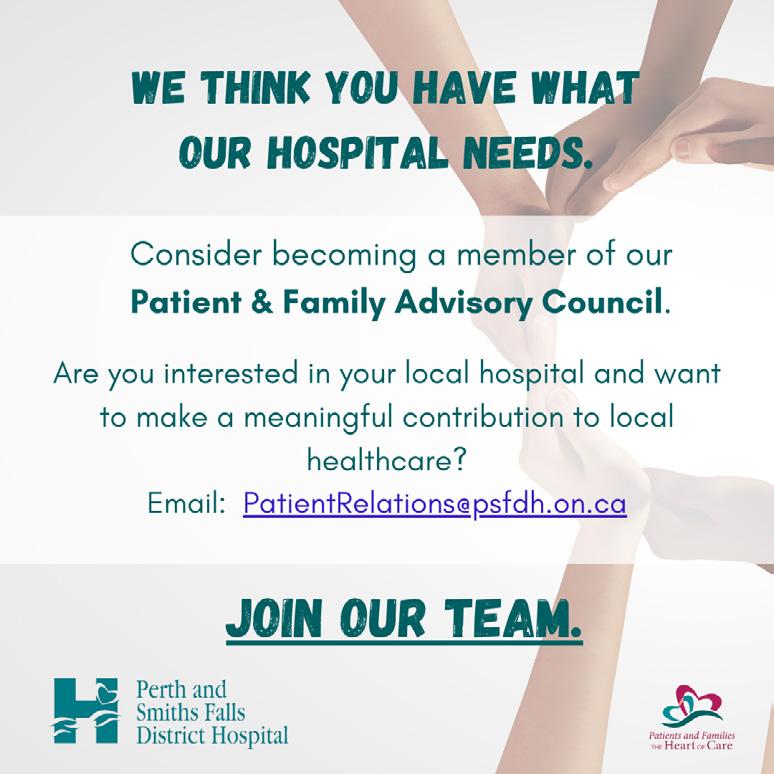
Other medical conditions and concerns:
Medication Record for:
Please write your name and home phone number in the space above Name: Phone Number:
Complete as much information as possible before seeing the doctor. Keep for your own records upon discharge and keep updated. Bring with you to all doctors’ appointments and hospital visits
List previous surgeries Date: (month/year )
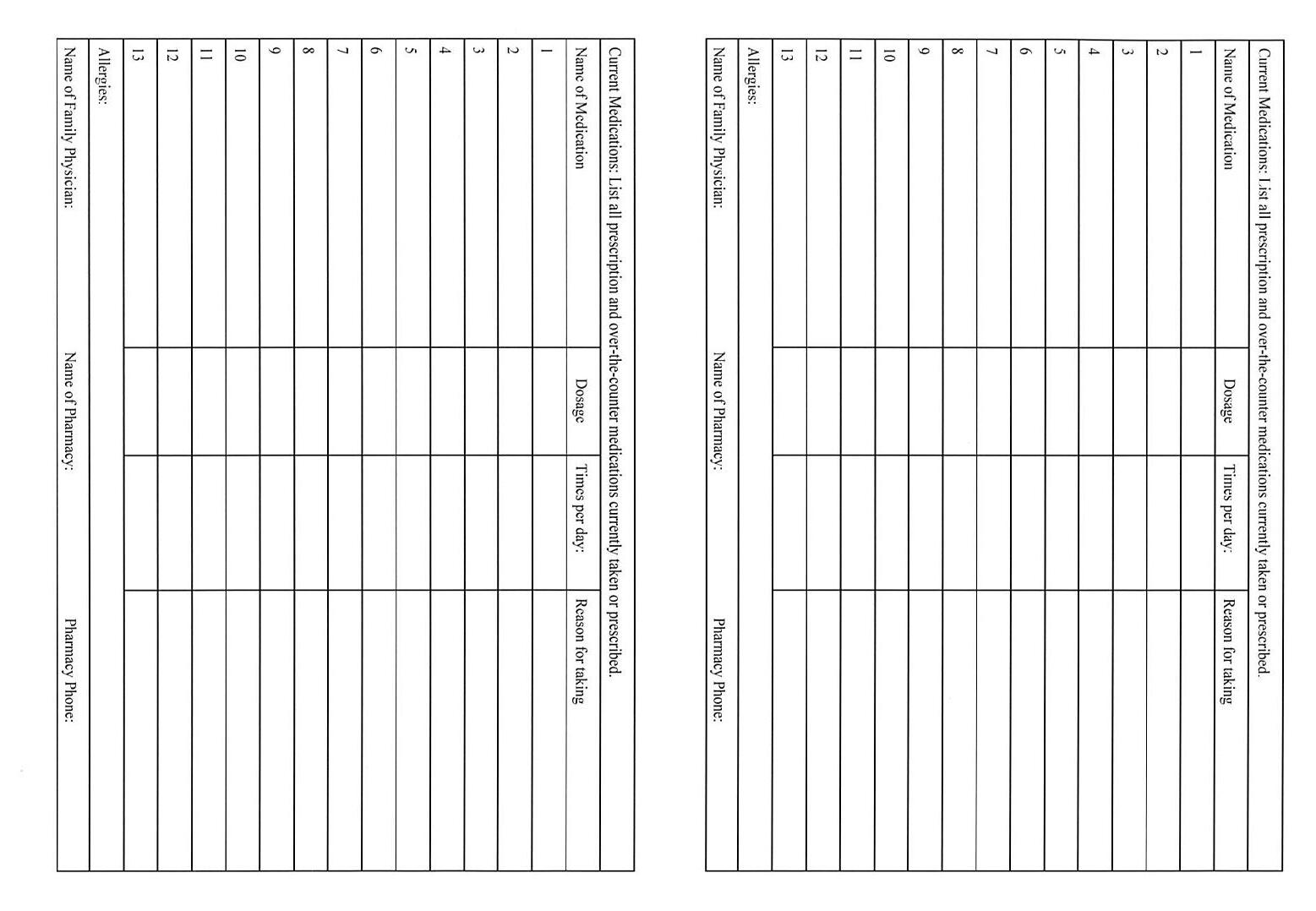
PSFDH is generously supported by the Perth & Smiths Falls District Hospital Foundation.
One Hospital. One Foundation. Two Sites.
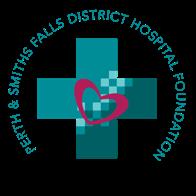
The PSFDH Foundation works with our community to raise and steward funds for projects and services for health care at PSFDH. Government funding models do NOT cover equipment like patient beds, IV pumps, an MRI machine, and many other vital components of a thriving hospital. As a result, it is the community that must provide needed funds.
Donors help us to maintain the high standard of patient care that we are proud of. New equipment has a ripple effect, bringing new doctors to a community, along with new surgical techniques and renewed economic prosperity.
Having services available at PSFDH for our community helps eliminate the need to travel to the city for care. This saves patients travel time, associated travel costs and allows them to be close by to their families.
Donations of any size help us to support and maintain the best quality of care for residents by funding exceptional health care by keeping care close to home!
The Foundation has offices on the main level at both sites of our hospital.


Personal Information
Name: ________________________________________________________________________________
Street Address:
City/Town: ________________________________ Province: _______ Postal Code: ____________
Email: ___________________________________________________
Donation Information
Gift amount: ☐ $20 ☐ $50 ☐ $100 ☐ Other $__________
Phone:
I prefer to give by: ☐Credit card (please fill out the credit card section below)
☐ Cheques (to be made payable to the PSFDH Foundation and mailed to one of the addresses below)
☐ Cash A tax receipt will be issued for gifts over $20
Type of Donation
☐Where the need is greatest ☐To the following department: __________________________________ ☐In memory of:
☐ I would like the family notified of my donation at the following address:
Name: _____________________________
Street Address: ____________________________________________________________
City/Town: __________________________________ Province: ________ Postal Code: ____________
Credit Card
Card Type: ☐ Visa ☐ Mastercard
Card #: ___________________________________________________ Expiry (mm/yr): _______/_______
Name on card: _____________________________________________ Security Code: ________
Signature: _________________________________________________ Date: ______________________
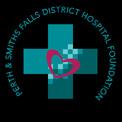
W
Falls ON K7A 2H9 343-881-GIVE (4483) or toll free 1-833-680-GIVE (4483) Registered Charity Number 1192 36016 RR0001
P l e a s e i n d i c a t e h o w w e a r e d o i n g : G r e a t G o o d P o o r C o m m e n t s
Qualit y of treatment y o u recei v ed Sta f f courte s y Physician c o urte s y Opport u nities to particip a te and communicate with your health care t eam were appr o priate . How would you ra t e the cleanliness o f the building? Was the inf o rmation provided in the booklet hel p ful? Would you recommen d this hospital to family and friends? Y e s N o If no, w h y not? Which area of the hospital did you visit?
Would you like someone from th e hospital to contact yo u about your visit? Y e s N o Ph on e Numb e r an d / or E ma i l:__
at patientrelations@psfdh.on.ca o r dr op off completed card in co m m ent box located on each site.

Perth and Smiths Falls District Hospital is grateful to all advertisers for helping to make this guide possible. Please note: an advertisement in this guide is not an endorsement by Perth and Smiths Falls District Hospital.
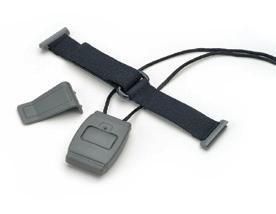
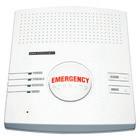







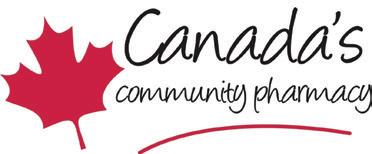
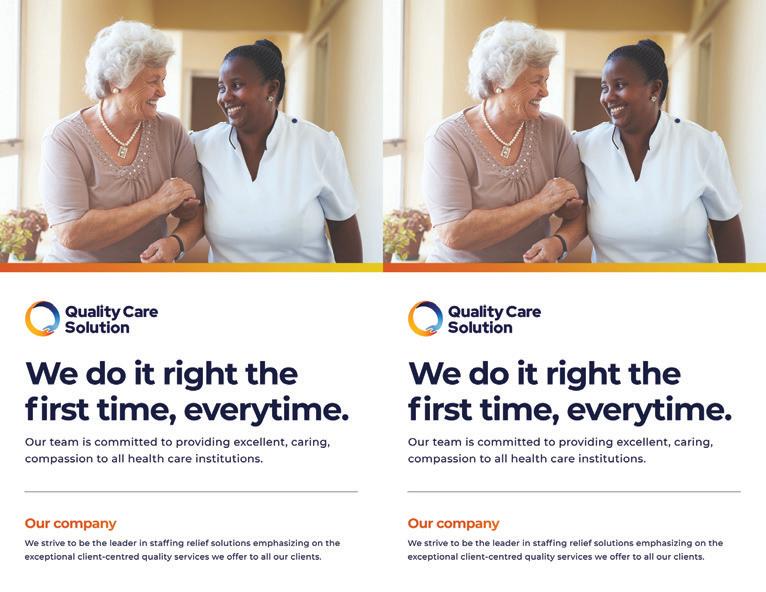


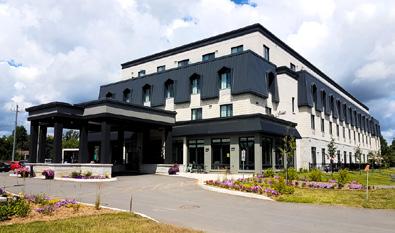
Suites from $2,495 monthly
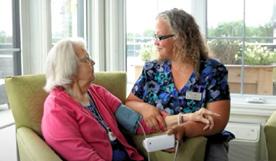
i
e
i l a b l e
2 p e r s o n t r a n s f e r s & m e c h a n i c a l l i f t s
a s s i s t e d l i v i n g & m e m o r y c a r e a v a i l a b l e
i n - h o u s e p h y s i c i a n
e m e r g e n c y c a l l s y s t e m s & c a l l b e l l s
n u r s i n g s t a f f 2 4 / 7
m e d i c a t i o n a d m i n i s t r a t i o n
d r i v i n g s e r v i c e f o r l o c a l m e d i c a l a p p o i n t m e n t s
O U R L O C A T I O N
2 4 0 G o r e S t r e e t E . ,
P e r t h , O n t a r i o , K 7 H 1 K 9
f e a t u r i n g o u r c a r e f u l l y c r a f t e d a l a c a r t
c c o m m o d a t i o n s f o r s p e c i a l i z e d d i e t s w e e k l y h o u s e k e e p i n g w i d e v a r i e t y o f a c t i


C O N T A C T U S
6 1 3 - 7 0 6 - 6 6 0 6
i n f o @ l a n a r k l i f e s t y l e s . c a
We provide transportation to families, seniors, children, youth and others living in Lanark County and the Town of Smiths Falls.










